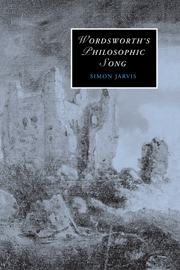5 - Infinity
Published online by Cambridge University Press: 22 September 2009
Summary
In one of Walter Benjamin's notes to himself, abutting the long arcades of quotation in his Passagenwerk, can be found the following:
The student ‘never stops learning’ the gambler ‘never has enough’ for the flâneur, ‘there is always something more to see’. Idleness has in view an unlimited duration, which fundamentally distinguishes it from simple sensuous pleasure, of whatever variety. (Is it correct to say that the ‘bad infinity’ that prevails in idleness appears in Hegel as the signature of bourgeois society?)
Wordsworth is sometimes thought of as a poet for whom there is no such thing as a bad infinity. Yet the ‘endless way’ of ‘Stepping Westward’, radiant with promise, does have its miserable counterpart, in the ‘illimitable walk’ which the poet encountered in London: ‘Still among streets with clouds and sky above…’ In the first, the illimitability of travel is a blessing; in the second it can appear almost to be a curse. Where do we stand with respect to the infinities, the endlessnesses, the illimitabilities with which Wordsworth is so often concerned? Are they, for us, merely so much devalued currency? Or is it possible that, by trying to distinguish among the precise tenors and weights of their various occurrences – in the city as well as at the summit – we might arrive at a sense of their real value?
- Type
- Chapter
- Information
- Wordsworth's Philosophic Song , pp. 133 - 152Publisher: Cambridge University PressPrint publication year: 2006



